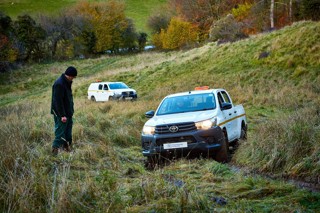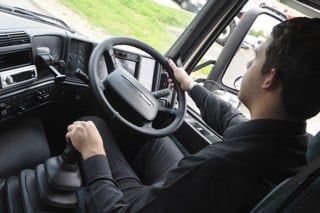The percentage of commercial drivers not adhering to rest break rules has increased year-on-year, with one in four now failing to stop for the required amount of time, new research suggests.
The study, from Verizon Connect, found that there was a 14% increase in drivers spending more than 4.5 hours at the wheel, without taking the mandated rest break of 45 minutes, compared to last year.
It also revealed that fewer than one in seven fleet managers (15%) said their vehicles had not been involved in an accident in the past 12 months.
Fatigue was identified as the cause for 15% of accidents that their vehicles were involved in, second only to speeding with 17%.
The Driver and Vehicle Standards Agency (DVSA) can issue drivers with an on-the-spot fine of up to £1,500 if they are not taking an adequate rest break and have the power to issue additional penalties to their employers.
On top of the potential financial penalties administered by the DVSA, the research also reveals that on average fleet managers lose 4.3 working days each year as a result of vehicle accidents across their fleet.
Derek Bryan, vice president EMEA at Verizon Connect, says that the pandemic has shone a light on the importance of fleet-based businesses and their drivers, many of whom were designated as key workers.
However, he told Commercial Fleet: “While their commitment is admirable, it simply can’t come at the expense of safety and taking the appropriate rest breaks.
“In such a competitive environment, and with expectations even higher, fleet businesses are no doubt feeling the pressure. They need to work smarter than ever to survive.
“This doesn’t mean cutting corners, especially when it comes to safety. It means deploying the right processes and systems so the business can operate at its absolute best.”
The Verizon research suggests that, despite the increase in drivers not taking rest breaks, fleet managers are working harder than ever to ensure they do.
Only one in 20 (5%) of fleet managers admitted that they do not track drivers’ breaks, compared with 11% in a similar study from 2019.
Fatigue also featured in the top three concerns of fleet managers when it comes to the health and safety of their drivers, second only to drivers using devices such as phones while driving, and drivers getting sick (due to Covid-19 or otherwise).
Compliance related tasks rank highly amongst fleet managers’ to-do list – accounting for 20% of their working days. Additionally, the average fleet manager spends just over two hours per week correcting and following up on mistakes in drivers’ tachograph data, the equivalent of 14 working days per year.
‘Negative impact’ on driver’s physical and mental health
A separate study, from the road safety charity IAM RoadSmart, paints a worrying picture for workers who drive for a living.
The IAM RoadSmart whitepaper says that delivery drivers, taxi and private hire drivers and even company car drivers face constant pressure to keep up with demand and this, along with resultant fatigue, has a negative impact on their mental and physical health.
The whitepaper also highlights the effect of weak employer strategies, lack of policies and prosecution for health and safety lapses, together with the ever-present strain from doubts over the economy, job security, redundancy and reduction in pay due to furlough.
IAM RoadSmart is calling for urgent changes to be made to support working drivers through a raft of solutions such as driver training, policies, advice and procedures.
These include education and guidance on avoiding driver fatigue and an evaluation of policies and procedures such as the length of the driving day and shifts.
Tony Greenidge, chief executive officer at IAM RoadSmart, said: “What Covid did was expose what in many cases was already there.
“Individuals involved in driving for work were already rushed and under pressure. Post-Covid they probably will be more so because there’s more fear about job security and more pressure on employers to recover lost ground. But at least now we are discussing it.”
IAM RoadSmart also believes further change needs to happen through increased prosecution of liable companies, especially SMEs, as one-third of road safety deaths are people driving for business.
Furthermore, it says that there should be a review on the resources available to drivers, such as motorway services and roadside facilities, as many drivers are deterred from stopping for essential rest due to prices.
Greenidge added: “People long for everything to go back to normal. The problem is, for many drivers normal wasn’t such a good place.
“The facts cannot be ignored and now is the time for CEOs and leaders to act. Covid-19 has significantly impacted an area already under immense strain. Drivers’ and riders’ safety cannot continue to slip through the net unnoticed.”
























Login to comment
Comments
No comments have been made yet.